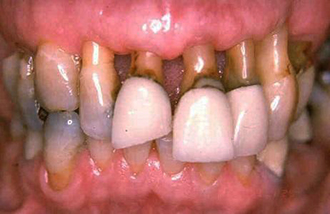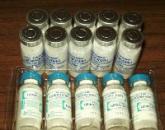Slippery saliva causes. Air and drinking mode. Reasons for increasing the viscosity of saliva
The liquid consistency of saliva is due to a significant water content of its composition (more than 98%), the remaining 2% is represented by salts, enzymes, amino acids and microelements, which allows for a protective and digestive function. Occurs when bothered with viscous saliva in the throat, indicating a negative influence of external factors or organ dysfunction.
Sometimes, even if we strictly adhere to the tips described above, the problem with bleeding gums remains. In such cases, homeopathy can give a lot. In combination with good oral hygiene, homeopathic medicines can provide an effective and long-term solution to the problem, although the act is relatively quick. Here are some of them that can help us.
Saliva is viscous, it is difficult to separate. There is pain that is aggravated by touching or chewing. Blood usually increases at night. The tongue is swollen, with fingerprints. Sometimes there are also notifications about this. Bleeding from the gums can also be accompanied by broken teeth. Often the patient has bad breath, described as mercury breathing.
Saliva, enveloping the food lump, facilitates its progress along the digestive tract, and the enzymes (amylase) present begin the process of splitting food in the oral cavity. In turn, lysozyme has a bactericidal effect, and therefore prevents infection.
The volume of saliva produced is controlled by the vegetative section of the NA, therefore, when it smells pleasantly, its secretion increases, and during sleep it decreases.
The taste in the mouth is sweet and metallic, accompanied by an increased sense of thirst. There may also be bleeding from the lips, or they are bright red. The teeth are also darker, brittle and carious. The taste in the mouth is bitter or rotten. Bleeding occurs during absorption. Common weakness and lack of energy are typical symptoms for the administration of this drug. They are actually a manifestation of oxygen starvation due to poor oxygenation of the blood. The tongue is taxed, with white or yellow-brown dough.
Snacks are often found in the mouth. Teeth are sensitive, especially when washing. The patient complains of dyspepsia - heaviness and weight in the stomach. Strong breathing appears from the mouth. The tongue is dry, especially at night. Bleeding is often accompanied by a sour taste in the mouth and acidic eruptions.
With regard to discoloration, consistency and composition of saliva, it is further influenced by precipitating factors.
Reasons for increasing the viscosity of saliva
Often, viscous saliva is not the only symptom that bothers a person. Symptomatology can be varied depending on the underlying disease or type of provoking external factor.
On the tip of the tongue and on the gums can be burning, which is enhanced by warm foods and drinks. The patient's gum is swollen and bleeds easily with bright red blood. Sometimes apologize about them. There is thirst, especially for ice water. Tongue dry, not flat, polished. These are just some of the main drugs for acute conditions. To prevent relapses, as well as for the final solution of the problem, you must assign a long - and so on. relief therapy.
The information presented in the article is general and not intended, and cannot replace medical examination and consultations. It is characterized by a period of hypotension of the infant and does not want to eat. After the first year of life, noticeable anger, obesity, small figure, hypogonadism, and mental retardation are noticeable. Andrea Prader, Swiss pediatrician and endocrinologist. His research included endocrine and metabolic disorders and impaired steroid hormone synthesis. He was president of the European Society of Pediatric Endocrinology.
Reasons include:
- dry mouth, as a manifestation of Sjogren's syndrome, is characterized by severe dryness mouth and a decrease in the volume of saliva with a change in its consistency in the direction of thickening. Pathology is also characterized by an increase in the density of the tongue, the appearance of an unpleasant odor, burning, dryness of the mucous membranes, lips, and changes in taste sensitivity. Sometimes patients notice tickling, pain in the oropharynx, “stuck” in the corners of the mouth, a violation of swallowing and gagging.
- candidal stomatitis caused by the activation of fungal pathogens. Manifested against the background of immunodeficiency, after a long course of antibiotic therapy, hormonal drugs, the use of contaminated fungi hygiene items or dishes. Of the clinical signs, it is worth highlighting the metallic taste, viscous saliva mixed with white lumps, difficulty in swallowing and itching on the oral mucosa.
Normally, in 75% of people, yeast-like fungi are present in the microflora of the oral cavity, however, they belong to opportunistic microorganisms and cause disease only under certain conditions.
Heinrich Willy, Swiss pediatrician. There is no difference in prevalence between men and women. Genes in this area undergo genomic imprinting, which means that gene expression varies depending on the parental origin of the chromosome.
On the other hand, when moving to the age of babies, polyphagy to obsessive food occurs, which leads to a significant increase in weight, which often leads to morbid obesity. At the same time, delayed psychomotor development. Hypogonadism and hypogenicity are present. In the next period, there is a frequent growth disorder, delayed puberty, behavioral disorders, cognitive function. Extremely striking craniofacial dysmorphism: narrowing of bimporal size, almond-shaped eyes, full face, carp mouth, low, dysplastic ears.

Medical events
Treatment is based on the cause that provoked the onset of this symptom. So, in therapy can be used:

Using hot steam for inhalation increases the risk of throat mucous burns.
In adulthood, obesity, short stature, acromyria, infertility prevail. Complications reduce life expectancy. The origin of the maternal uniparial chromosome can be performed in three cases. The fusion of normal sperm and wild eggs and the subsequent loss of a single chromosome from the trisomic zygote.
Chromosome duplication in monosomy 15 in zygote. The fusion of null-isomic sperm and wild egg. At the same time, half of imprinting defects can be proved by microdeletion. In this case, the incidence is familial. For the second half of imprinting defects, microdeletion cannot be demonstrated; these cases are accompanied by sporadic occurrence.
Prevention
To avoid the appearance of unpleasant sensations in the mouth, associated with an increase in the viscosity of saliva, it is recommended to follow some tips:
- the daily volume of fluid consumed should not be less than 1.5-2 liters;
- treatment of diseases of the teeth, gums and otolaryngological diseases;
- avoiding alcohol, smoking, carbonated drinks and coffee;
- air humidification in the room;
- frequent airing and wet cleaning in the room;
- controlled medication;
- treatment of endocrine pathology and diseases of the nervous system;
- full replacement of liquid losses at intestinal infection by increasing the drinking regimen or using infusion therapy (with severe dehydration).
Increasing saliva viscosity is not dangerous symptom, however, leads to discomfort in the mouth.
Large criteria are evaluated at one point, which is a small half. A clinical diagnosis can be determined if we have at least five points for a child under three years old, four of which are based on large criteria. In persons older than three years, we must reach eight points, five of which are in the main criteria. In case of border visualization, additional criteria can help us.
In laboratory diagnosis, several methods are used. The high resolution technique is the oldest and is suitable for detecting translocations and large deletions. This is positive in the case of deletion, as well as a unipariant disc or imprinting defect.
This may interfere with the conversation, complicate the process of eating, as well as reduce the protective properties of saliva. That is why it is necessary to pay attention to this symptom in time and consult with your doctor.
Popular
- Breast cancer is curable at any stage.
- The remedy for the cold Sinupret
- Azitrox - official instructions for use
- Chicken-bjaka: allowed antibiotics were found in Russian chicken
- Oral Cancer: Symptoms and Treatment
- Dark and thick blood during menstruation.
- Modern analogues of doxycycline tablets
- Is it possible to die from pneumonia
- What earwax will tell all about your health
- Tussin: instructions for use



